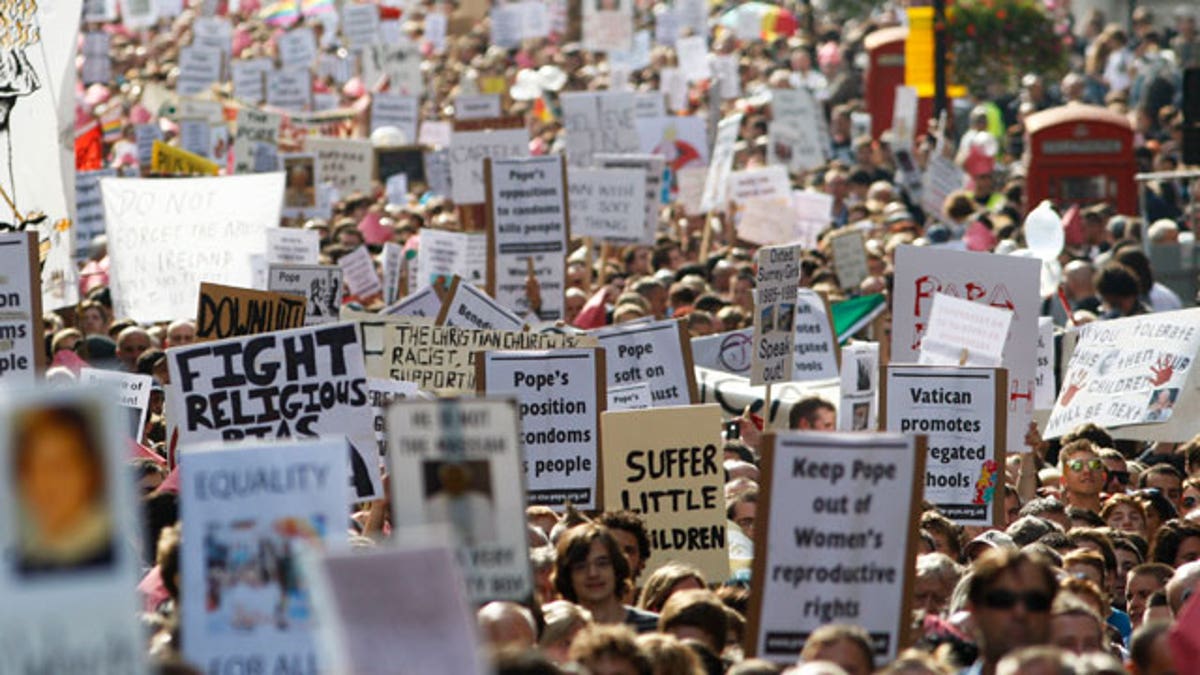
Thousands of people march through central London to protest against the State visit of Pope Benedict XVI to Britain, Saturday, Sept. 18, 2010. Pope Benedict XVI is on a four-day visit, the first-ever state visit by a Pope to Britain. (AP)
LONDON – LONDON (AP) — Pope Benedict XVI wraps up his visit to Britain with the beatification Sunday of Cardinal John Henry Newman, the 19th century Anglican convert held up by the pope as a model for the faithful because he followed his conscience at great personal cost.
Newman is admired by many Catholics and Anglicans alike and his influence on both churches is enormous. Yet his defection from the Church of England in 1845 still rankles some in that he abandoned Anglicanism because he realized the truth he was searching could only be found in the Catholic faith.
Benedict praised Newman on the eve of his beatification at a prayer vigil in London's Hyde Park that drew an estimated 80,000 people — a significant turnout given Catholics represent only 10 percent of the population in this deeply secular country.
The vigil capped a busy day for the pontiff, his third in Britain: He met with four women and a man who were molested by priests as children, told British Catholics at a Mass in Westminster Cathedral he was ashamed by such "unspeakable" crimes and said he hoped the humiliation the church feels will help victims and the church alike heal.
As Benedict met with the victims, thousands of people marched through central London to protest his visit, angered by the abuse scandal as well as Benedict's hard line against gays, abortion, women's ordination and using condoms to fight AIDS. It was the biggest demonstration ever against Benedict in his 5-year papacy.
But a few hours later he was warmly welcomed in Hyde Park by British faithful from every diocese in the nation for a prayer vigil for Newman's beatification, which Benedict will celebrate Sunday in Birmingham.
Newman was one of the founders of the so-called Oxford Movement of the 1830s, which sought to revive certain Roman Catholic doctrines in the Church of England by looking back to the traditions of the earliest Christian church.
Anglicans split from Rome in 1534 when English King Henry VIII was refused a marriage annulment. In the centuries that followed, Catholics in Britain were fined, discriminated against and killed for their faith.
Newman gave up a brilliant academic career at Oxford University and the pulpit of the university church to convert to Catholicism in 1845, convinced that the truth that he had been searching for could no longer be found in the Church of England. The decision caused pain at a personal and institutional level, in that he lost friends and Anglicans lost one of their brightest stars.
Speaking Saturday night, Benedict said Newman's life "teaches us that passion for the truth, intellectual honesty and genuine conversion are costly."
"In our own time, the price to be paid for fidelity to the Gospel is no longer being hanged, drawn and quartered but it often involves being dismissed out of hand, ridiculed or parodied," he said.
For Benedict, Newman also represents a model in that he fought against the same moral relativism — the idea that all religions are the same and that there's no objective truth — that Benedict has denounced during his papacy.
Benedict will move Newman a step closer to possible sainthood in an open-air Mass, the spiritual highlight of his four-day state visit to Britain. It's the first time Benedict will celebrate a beatification; under his own rules popes don't beatify, only canonize.
For the German-born, by-the-book professor, such an exception to his own rule is significant. It's a calculated gesture that underscores Benedict's view that Newman is a crucial model for all Christians at a time when Christianity is on the wane in an increasingly secularized Europe.
Yet Newman's legacy is complex for Anglicans and Catholics alike: Liberals like his emphasis on conscience, conservatives admire his submission to authority and his devotion to celibacy. Some gay activists have claimed him as one of their own, as Newman was buried in the same grave with the Rev. Ambrose St. John, his companion of more than 30 years.
Church officials insist there is nothing in the record that shows Newman was gay, noting that double graves were common at the time and that Newman had many intense friendships with men and women yet remained chaste.
Many have questioned whether Benedict's glorification of such a famous Anglican convert during a state visit to Britain might be perceived as a provocation to an Anglican church weak from internal divisions over women's ordination as bishops. It also comes at a delicate time in Catholic-Anglican relations following Rome's move last year to make it easier for Anglicans to convert.
In addition, the feast day the Vatican has chosen for Newman is Oct. 9, the anniversary of his conversion, as opposed to the usual anniversary of his death. Church officials have argued that his Aug. 11 anniversary was already taken by another saint, but that's true also for Oct. 9.
"It is highly unusual and could give the impression that Newman's entrance into the Roman Catholic Church was more significant than his entrance into Heaven," said the Rev. James Martin, a Catholic writer.
Episcopal Rev. Louis Weil, emeritus professor of liturgy at the Church Divinity School of the Pacific in Berkeley, California who has written about Newman and the Oxford Movement, said he hadn't heard any Anglicans come out against the beatification and that few should have any problem with it if they know about Newman at all.
"I suspect that most Anglican feel in this regard much as I do: I rejoice to see people become Roman Catholics if that is where they can find their true spiritual home," he said in an e-mail.








































